2024年中考一轮复习人教版 英语九年级全册Unit 2 课件(共24张PPT)
文档属性
| 名称 | 2024年中考一轮复习人教版 英语九年级全册Unit 2 课件(共24张PPT) | 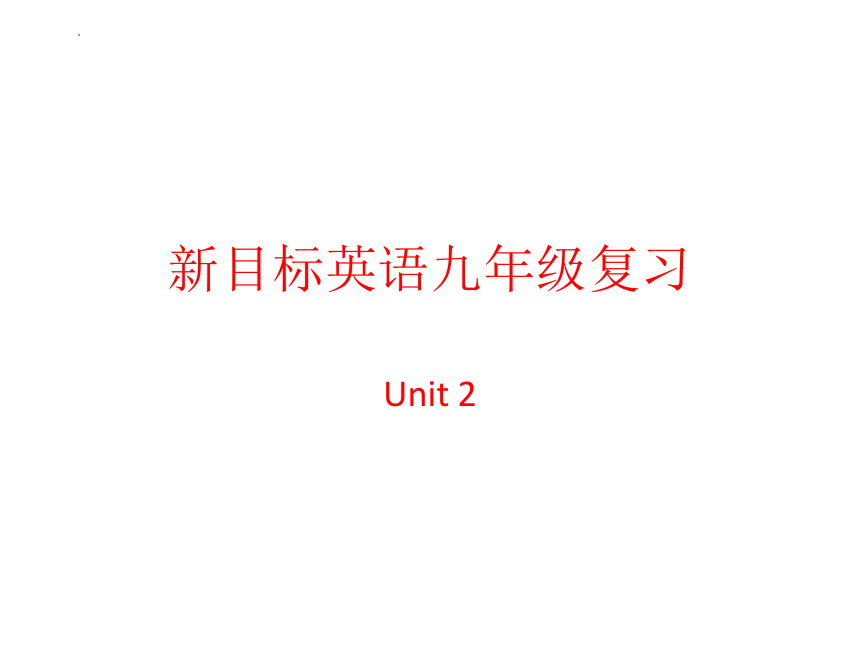 | |
| 格式 | pptx | ||
| 文件大小 | 120.1KB | ||
| 资源类型 | 教案 | ||
| 版本资源 | 人教新目标(Go for it)版 | ||
| 科目 | 英语 | ||
| 更新时间 | 2024-05-08 14:12:26 | ||
图片预览

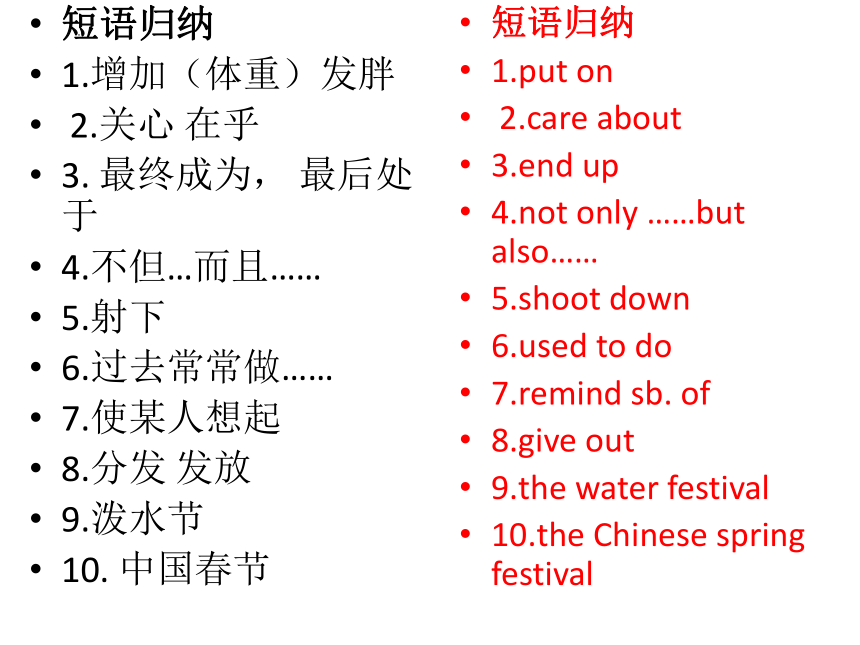
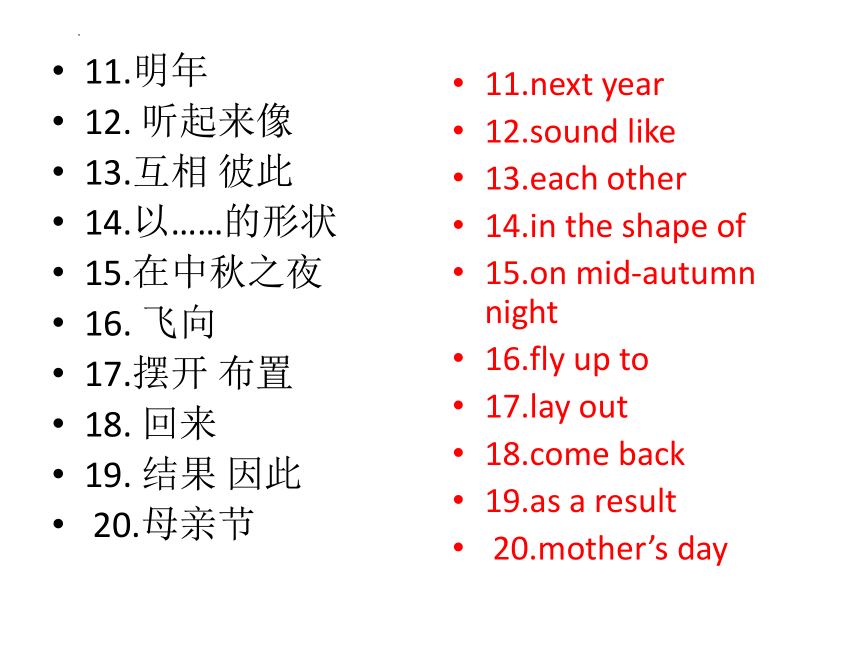
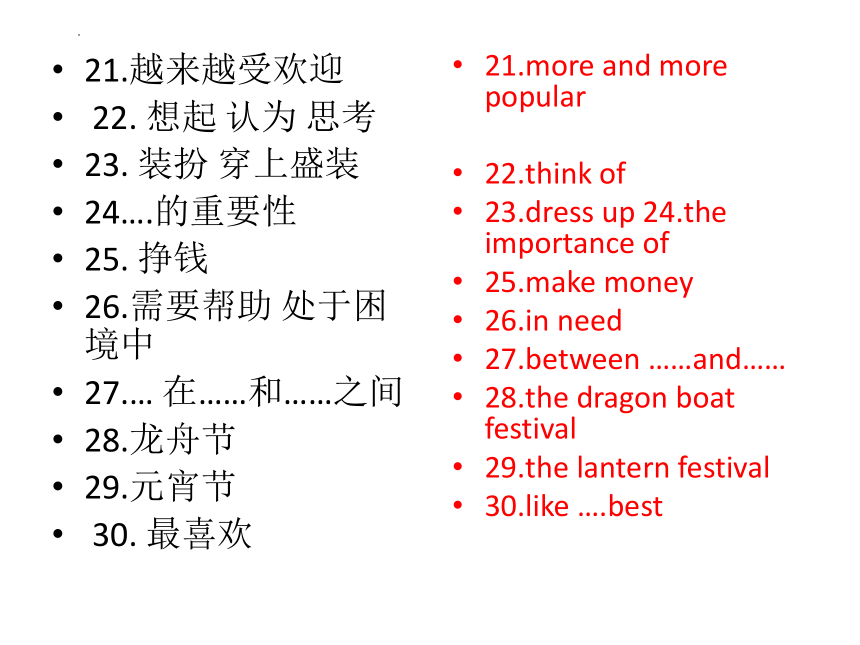
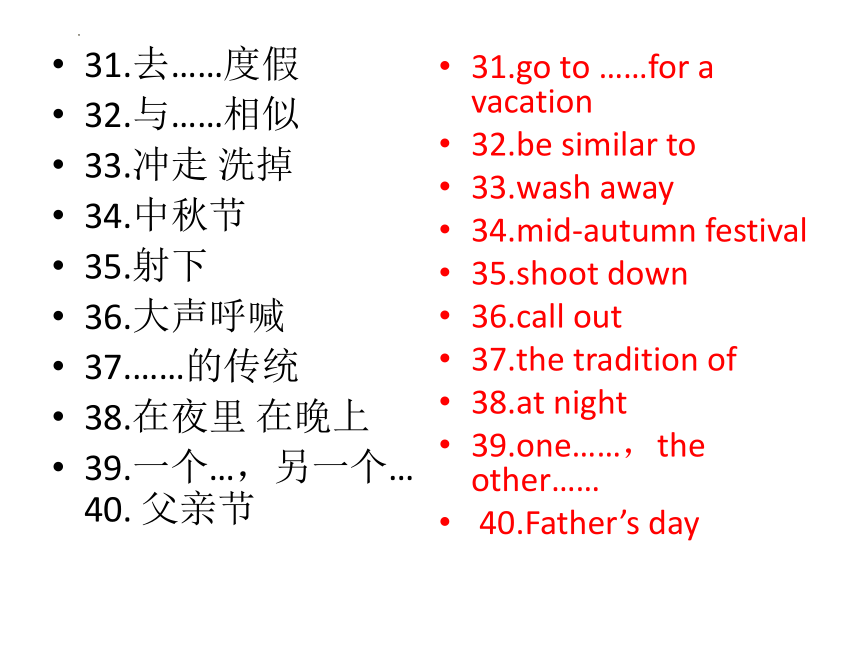
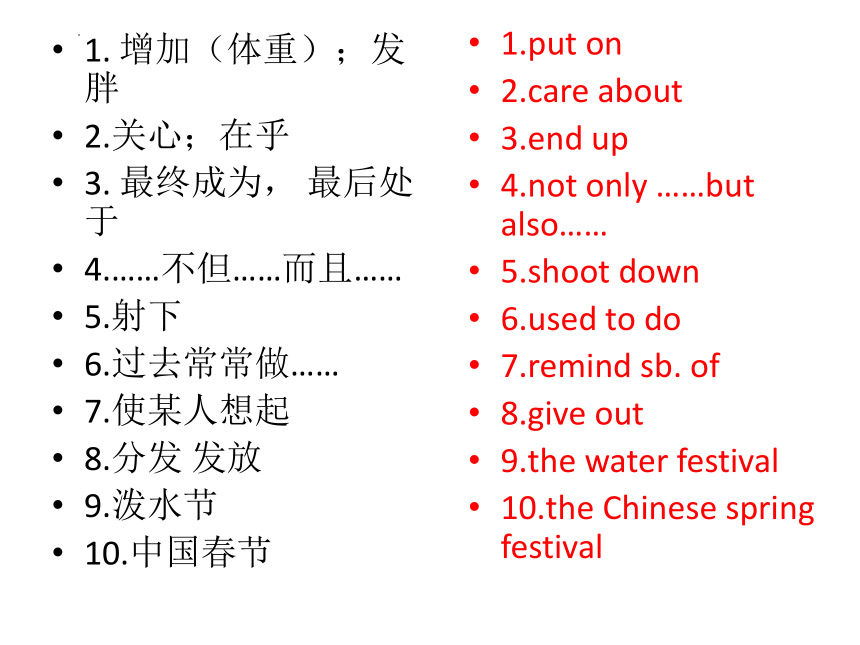

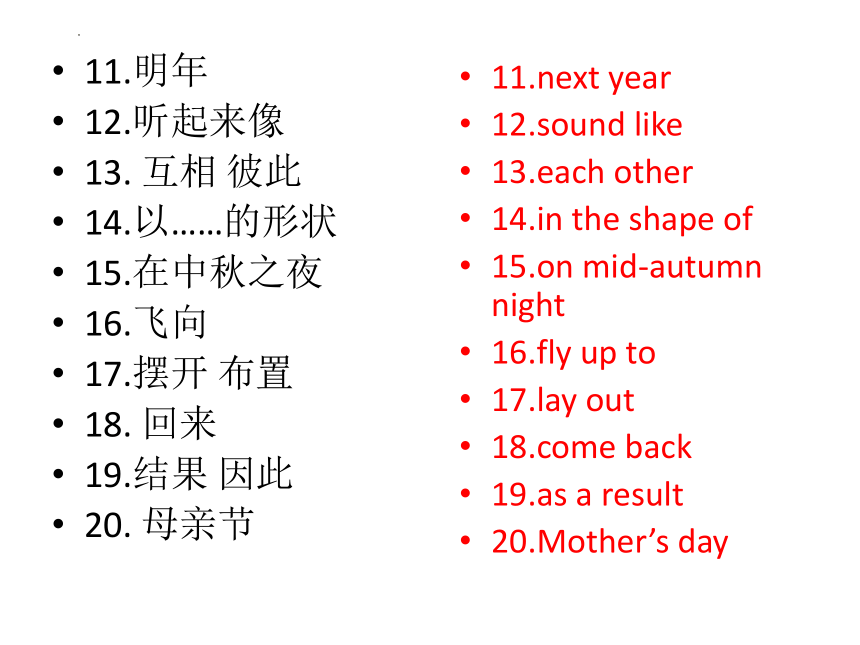

文档简介
(共24张PPT)
新目标英语九年级复习
Unit 2
短语归纳
1.增加(体重)发胖
2.关心 在乎
3. 最终成为, 最后处于
4.不但…而且……
5.射下
6.过去常常做……
7.使某人想起
8.分发 发放
9.泼水节
10. 中国春节
短语归纳
1.put on
2.care about
3.end up
4.not only ……but also……
5.shoot down
6.used to do
7.remind sb. of
8.give out
9.the water festival
10.the Chinese spring festival
11.明年
12. 听起来像
13.互相 彼此
14.以……的形状
15.在中秋之夜
16. 飞向
17.摆开 布置
18. 回来
19. 结果 因此
20.母亲节
11.next year
12.sound like
13.each other
14.in the shape of
15.on mid-autumn night
16.fly up to
17.lay out
e back
19.as a result
20.mother’s day
21.越来越受欢迎
22. 想起 认为 思考
23. 装扮 穿上盛装
24….的重要性
25. 挣钱
26.需要帮助 处于困境中
27.… 在……和……之间
28.龙舟节
29.元宵节
30. 最喜欢
21.more and more popular
22.think of
23.dress up 24.the importance of
25.make money
26.in need
27.between ……and……
28.the dragon boat festival
29.the lantern festival
30.like ….best
31.去……度假
32.与……相似
33.冲走 洗掉
34.中秋节
35.射下
36.大声呼喊
37.……的传统
38.在夜里 在晚上
39.一个…,另一个… 40. 父亲节
31.go to ……for a vacation
32.be similar to
33.wash away
34.mid-autumn festival
35.shoot down
36.call out
37.the tradition of
38.at night
39.one……,the other……
40.Father’s day
1. 增加(体重);发胖
2.关心;在乎
3. 最终成为, 最后处于
4.……不但……而且……
5.射下
6.过去常常做……
7.使某人想起
8.分发 发放
9.泼水节
10.中国春节
1.put on
2.care about
3.end up
4.not only ……but also……
5.shoot down
6.used to do
7.remind sb. of
8.give out
9.the water festival
10.the Chinese spring festival
41. 必须 不得不
42.捉弄某人
43.……的精神
44.关心
45. 醒来
46.……的开始
41.have to
42.play a trick on sb
43.the spirit of
44.care about
45.wake up
46.the beginning of
11.明年
12.听起来像
13. 互相 彼此
14.以……的形状
15.在中秋之夜
16.飞向
17.摆开 布置
18. 回来
19.结果 因此
20. 母亲节
11.next year
12.sound like
13.each other
14.in the shape of
15.on mid-autumn night
16.fly up to
17.lay out
e back
19.as a result
20.Mother’s day
what引导的感叹句:
1.Whata/an+形容词+可数名词的单数+主语+谓语!
她是一个多 么漂亮的女孩啊!
What a beautiful girl she is!
2.What+形容词+可数名词的复数+主语+谓语!
他们做了多么重要的工作啊!
What important jobs they have done!
3.What+形容词+不可数名词+主语+谓语!
多甜的水啊!
What sweet water it is!
how引导的感叹句:
1.How +形容词/副词+主语+谓语!
多有趣的电影啊!
How interesting the movie is!
2.How+形容词+a/an+可数名词单数+主语+谓语!
多么有用的一个学科啊!
How useful a subject it is!
3.How+主语+谓语!
时间过得真快啊
How time fies!
经典例题
1.---_____ brave Zhang Hua is!
---Yes. He helped his neighbor, Mrs. Sun, out of the fire.
A. What a B. How C. How a D. What
2.---_____ weather it is! We can’t go boating on the Xuanwu Lake.
---Don’t worry. Let’s go to the Science Museum instead.
A. What good B. How good C. How bad D. What bad
3. ---Steve, did you see the lantern show when you were in Fuzhou
---Of course! ________ beautiful lanterns!
A. What B. How C. What a D. How a
答案:B D A
将下列句子改为感叹句
It’s a nice dress.
They are lovely animals.
It’s bad weather.
Her son is very naughty
She is a very careful student.
What a nice dress !
What lovely animals they are!
What bad weather it is !
How naughty her son is !
What a carefuo student she is !
care about与care for的辨析:
我父母关心我的健康.
My parents____________ my health.
(1) care about意为“关心;在乎;介意”,强调出于责任感而“关心;在乎”
(2)我离开时,他帮我照顾我母亲。
He helped me_________ my mother when I left.
care for可意为“照料;照顾”,与take care of同义;也可意为“喜欢”,多用于疑问句或否定句,
经典例题
Bill is a new student. You should ________ him.
A. look at B. care about C. listen to D. take after
care about
care for
remind
那首歌使你想起你的妈妈吗?
Does that song__________________________
(1) remind是及物动词,意思是“提醒、使某人想起”,经常和介词of连用构成动词短语
remind somebody of somebody/something
=remind somebody that+从句,
意思是“使某人想起某事或者某人”。
(2) 动词短语remind somebody to do something的意思是“提醒某人做某事”。
Please remind me to return the books to the library.
请提醒我把这些书还给图书馆。
经典例题
The music reminds her ______ the happy time.
A. in B. for C. from D. of
remind you of your mother
— How soon will the dinner ready
晚饭还有多长时间做好?
— In ten minutes.
十分钟后。
— How soon will they come back
他们多久回来?
— In two weeks.
两周后。
in two weeks意为“两周后”,表示将来的时间,常用how soon来对其提问。
1. I think the dragon boat is very beautiful.(改否定句)
2. My mother believes that Lily will pass the exam this time(对画线部分提问)。
3. It is a very useful dictionary. (同义句)
4. The students are listening very carefully. (改感叹句)
5. It’s interesting work to teach the children. (改为感叹句)
I don’t think the dragon boat is very beautiful.
What does your mother believe
① What a useful dictionary it is!
② How useful the dictionary is!
How carefully the students are listening!
How interesting it is to teach the children!.
他告诫她保持沉默
1) warn sb. (not) to do sth. 意为“告诫某人(不要)做某事”。
她提醒我们注意形势的严峻性
2) warn sb. about sth. 意为“提醒某事注意某事”。
3) warn sb. of/against (doing) sth. 意为“告诫某人当心/提防(做)某事”。
他们告诫我不要在河的那一带游泳。
经典例题
He warned Billy ________ away from his daughter.
A. to keep B. keeps C. keeping D. kept
He warned her to keep silent.
She warned us about the serious situation.
They warned me against swimming in that part of the river.
A
end up意为“最终成为;最后处于,结束”,其后可以跟with; doing
3) end up doing 表示“以做……结束”。
晚会以一首英文歌而结束。
经典例题
1.The boats take different routes, but they all ______ in the same place.
A. give up B. clear up C. end up D. make up
2.Will you ________ speaking Chinese when you have an English conversation
A. end up B. end up with C. ends up D. ends up with
The party ended up singing an English song.
CA
宾语从句三要素 :
(一) 引导词
1. 由从属连词that引导的宾语从句,that在句中无词汇意义,在从句中不能充当成分,在口语当中往往省略e.g.I hear (that) you passed the exam.
2.由从属连词 whether, if引导的宾语从句, if/ whether “是否”,说明对陈述的事物不明确或不清楚。常用在ask, wonder, can(could) you tell me等后。eg. I want to know whether/if he is right.
(二)语序:陈述句语序 即:主句+连接词+从句(主+谓+其他成分)
(三)时态:
1、主句用一般现在时,现在进行时或一般将来时等“现在”范畴的时态时,从句的时态根据需要来用,不受主句影响
【例句】I want to know what time he got up this morning.
2、主句用过去时,从句用与过去相关的时态。
【例句】Kate said there was a box under the desk.
3、从句说明的是一般真理、客观事实、自然现象、名言时,仍用现在时。
【例句】He told me the earth moves around the sun.
4、从句中有具体时间状语,即使从句动作发生在主句动作前,仍用一般过去时。
【例句】Jack told me he had returned the book two days ago.
只能用whether不能用if的情况
1.在介词后面:
【例句】I’m thinking of whether we should go fishing.
2.在动词不定式前:
【例句】They asked me whether to go skating.
3.当与or not连用,或提出两种选择时:
【例句】I don’t know whether he’s free or not.
4.宾语从句提前时:
【例句】Whether this is true or not, I can’t say.
【课堂变式】
Tony wonders _____ or not he can go out with friends.
A. that B. if C. whether D. how
每次都是父亲把餐具摆好
The father _________________________ 。
【横向辐射】辨析lay和lie
1.lay表示将某物放于某处或某个位置,作及物动词。lay的过去式和过去分词均为laid,
【例句】They laid him on the floor 他们把他放在地上。
2. lie则为不及物动词,其过去式为lay,过去分词为lain:【例句】I lay on the floor with my legs in the air
我躺在地上,双腿抬起。
【课堂变式】
When we got home, the food had ______on the table.
A. been lay B. laid
C. been laid D. been lain
always laid the table.
C。
1. Nobody but Jim is brave enough to enter into the ____________ (闹鬼的)house.
2. Nowadays, many students like to read the stories of the___________ (鬼)and witches
3. Ted was unhappy because his parentsalways —— (看待)him as a child.
4. Mary was frightened because she found a big _________ (蜘蛛)on her bed.
5. Tom can make some kinds of ______ (把戏) to make us laugh
haunted
ghosts
treated
spider
Treats
1. Our village_______ (位于) the foot of that mountain.
2. My mother liked to read the ______ (小说) written by Lu Xun.
3. Mr. Tang will go to Beijing on _____ (生意) next week.
4. The police_________ (警告) the driver to drive carefully because of the snow.
5. The old man________ (传播)his love and joy to everyone wherever he went.
lies
novels
business
warns
spread
1.die
强调的是“死”的动作,是个短暂性动词,强调“死”的一瞬间动作,不能和时间段连用。
【例句】He died in an accident. 他遇难身死。
Every winter some old people die from hypothermia. 每年冬天都有些老人死于体温过低。
2.dead
强调的是“死”的状态,意为“死的、无生命的”,是形容词,作表语或定语。如果表达“死了多长时间”,则用“have been dead+ for+时间段”或“died+时间段+ago”。
【例句】He has been dead for two years. (=He died two years ago.) 他死了两年了。
These flowers are dead. 这些花枯死了。
3.dying
它是die的现在分词,也可用形容词,表示“垂死”、“要死”的意思,常用作定语或表语。
【例句】He is afraid he is dying. 他担心他要死了。
The doctor tried to save the dying boy. 医生努力抢救这个垂危的孩子。Her grandfather ____ for three years.
A. died B. has died C. has been dead D. was dead
【解析】die是短暂性动词,若用在现在完成时中和时间段搭配,则要改为be dead结构。由句中的for three years 可知要艇has been dead,而不能用has die。故选C。
新目标英语九年级复习
Unit 2
短语归纳
1.增加(体重)发胖
2.关心 在乎
3. 最终成为, 最后处于
4.不但…而且……
5.射下
6.过去常常做……
7.使某人想起
8.分发 发放
9.泼水节
10. 中国春节
短语归纳
1.put on
2.care about
3.end up
4.not only ……but also……
5.shoot down
6.used to do
7.remind sb. of
8.give out
9.the water festival
10.the Chinese spring festival
11.明年
12. 听起来像
13.互相 彼此
14.以……的形状
15.在中秋之夜
16. 飞向
17.摆开 布置
18. 回来
19. 结果 因此
20.母亲节
11.next year
12.sound like
13.each other
14.in the shape of
15.on mid-autumn night
16.fly up to
17.lay out
e back
19.as a result
20.mother’s day
21.越来越受欢迎
22. 想起 认为 思考
23. 装扮 穿上盛装
24….的重要性
25. 挣钱
26.需要帮助 处于困境中
27.… 在……和……之间
28.龙舟节
29.元宵节
30. 最喜欢
21.more and more popular
22.think of
23.dress up 24.the importance of
25.make money
26.in need
27.between ……and……
28.the dragon boat festival
29.the lantern festival
30.like ….best
31.去……度假
32.与……相似
33.冲走 洗掉
34.中秋节
35.射下
36.大声呼喊
37.……的传统
38.在夜里 在晚上
39.一个…,另一个… 40. 父亲节
31.go to ……for a vacation
32.be similar to
33.wash away
34.mid-autumn festival
35.shoot down
36.call out
37.the tradition of
38.at night
39.one……,the other……
40.Father’s day
1. 增加(体重);发胖
2.关心;在乎
3. 最终成为, 最后处于
4.……不但……而且……
5.射下
6.过去常常做……
7.使某人想起
8.分发 发放
9.泼水节
10.中国春节
1.put on
2.care about
3.end up
4.not only ……but also……
5.shoot down
6.used to do
7.remind sb. of
8.give out
9.the water festival
10.the Chinese spring festival
41. 必须 不得不
42.捉弄某人
43.……的精神
44.关心
45. 醒来
46.……的开始
41.have to
42.play a trick on sb
43.the spirit of
44.care about
45.wake up
46.the beginning of
11.明年
12.听起来像
13. 互相 彼此
14.以……的形状
15.在中秋之夜
16.飞向
17.摆开 布置
18. 回来
19.结果 因此
20. 母亲节
11.next year
12.sound like
13.each other
14.in the shape of
15.on mid-autumn night
16.fly up to
17.lay out
e back
19.as a result
20.Mother’s day
what引导的感叹句:
1.Whata/an+形容词+可数名词的单数+主语+谓语!
她是一个多 么漂亮的女孩啊!
What a beautiful girl she is!
2.What+形容词+可数名词的复数+主语+谓语!
他们做了多么重要的工作啊!
What important jobs they have done!
3.What+形容词+不可数名词+主语+谓语!
多甜的水啊!
What sweet water it is!
how引导的感叹句:
1.How +形容词/副词+主语+谓语!
多有趣的电影啊!
How interesting the movie is!
2.How+形容词+a/an+可数名词单数+主语+谓语!
多么有用的一个学科啊!
How useful a subject it is!
3.How+主语+谓语!
时间过得真快啊
How time fies!
经典例题
1.---_____ brave Zhang Hua is!
---Yes. He helped his neighbor, Mrs. Sun, out of the fire.
A. What a B. How C. How a D. What
2.---_____ weather it is! We can’t go boating on the Xuanwu Lake.
---Don’t worry. Let’s go to the Science Museum instead.
A. What good B. How good C. How bad D. What bad
3. ---Steve, did you see the lantern show when you were in Fuzhou
---Of course! ________ beautiful lanterns!
A. What B. How C. What a D. How a
答案:B D A
将下列句子改为感叹句
It’s a nice dress.
They are lovely animals.
It’s bad weather.
Her son is very naughty
She is a very careful student.
What a nice dress !
What lovely animals they are!
What bad weather it is !
How naughty her son is !
What a carefuo student she is !
care about与care for的辨析:
我父母关心我的健康.
My parents____________ my health.
(1) care about意为“关心;在乎;介意”,强调出于责任感而“关心;在乎”
(2)我离开时,他帮我照顾我母亲。
He helped me_________ my mother when I left.
care for可意为“照料;照顾”,与take care of同义;也可意为“喜欢”,多用于疑问句或否定句,
经典例题
Bill is a new student. You should ________ him.
A. look at B. care about C. listen to D. take after
care about
care for
remind
那首歌使你想起你的妈妈吗?
Does that song__________________________
(1) remind是及物动词,意思是“提醒、使某人想起”,经常和介词of连用构成动词短语
remind somebody of somebody/something
=remind somebody that+从句,
意思是“使某人想起某事或者某人”。
(2) 动词短语remind somebody to do something的意思是“提醒某人做某事”。
Please remind me to return the books to the library.
请提醒我把这些书还给图书馆。
经典例题
The music reminds her ______ the happy time.
A. in B. for C. from D. of
remind you of your mother
— How soon will the dinner ready
晚饭还有多长时间做好?
— In ten minutes.
十分钟后。
— How soon will they come back
他们多久回来?
— In two weeks.
两周后。
in two weeks意为“两周后”,表示将来的时间,常用how soon来对其提问。
1. I think the dragon boat is very beautiful.(改否定句)
2. My mother believes that Lily will pass the exam this time(对画线部分提问)。
3. It is a very useful dictionary. (同义句)
4. The students are listening very carefully. (改感叹句)
5. It’s interesting work to teach the children. (改为感叹句)
I don’t think the dragon boat is very beautiful.
What does your mother believe
① What a useful dictionary it is!
② How useful the dictionary is!
How carefully the students are listening!
How interesting it is to teach the children!.
他告诫她保持沉默
1) warn sb. (not) to do sth. 意为“告诫某人(不要)做某事”。
她提醒我们注意形势的严峻性
2) warn sb. about sth. 意为“提醒某事注意某事”。
3) warn sb. of/against (doing) sth. 意为“告诫某人当心/提防(做)某事”。
他们告诫我不要在河的那一带游泳。
经典例题
He warned Billy ________ away from his daughter.
A. to keep B. keeps C. keeping D. kept
He warned her to keep silent.
She warned us about the serious situation.
They warned me against swimming in that part of the river.
A
end up意为“最终成为;最后处于,结束”,其后可以跟with; doing
3) end up doing 表示“以做……结束”。
晚会以一首英文歌而结束。
经典例题
1.The boats take different routes, but they all ______ in the same place.
A. give up B. clear up C. end up D. make up
2.Will you ________ speaking Chinese when you have an English conversation
A. end up B. end up with C. ends up D. ends up with
The party ended up singing an English song.
CA
宾语从句三要素 :
(一) 引导词
1. 由从属连词that引导的宾语从句,that在句中无词汇意义,在从句中不能充当成分,在口语当中往往省略e.g.I hear (that) you passed the exam.
2.由从属连词 whether, if引导的宾语从句, if/ whether “是否”,说明对陈述的事物不明确或不清楚。常用在ask, wonder, can(could) you tell me等后。eg. I want to know whether/if he is right.
(二)语序:陈述句语序 即:主句+连接词+从句(主+谓+其他成分)
(三)时态:
1、主句用一般现在时,现在进行时或一般将来时等“现在”范畴的时态时,从句的时态根据需要来用,不受主句影响
【例句】I want to know what time he got up this morning.
2、主句用过去时,从句用与过去相关的时态。
【例句】Kate said there was a box under the desk.
3、从句说明的是一般真理、客观事实、自然现象、名言时,仍用现在时。
【例句】He told me the earth moves around the sun.
4、从句中有具体时间状语,即使从句动作发生在主句动作前,仍用一般过去时。
【例句】Jack told me he had returned the book two days ago.
只能用whether不能用if的情况
1.在介词后面:
【例句】I’m thinking of whether we should go fishing.
2.在动词不定式前:
【例句】They asked me whether to go skating.
3.当与or not连用,或提出两种选择时:
【例句】I don’t know whether he’s free or not.
4.宾语从句提前时:
【例句】Whether this is true or not, I can’t say.
【课堂变式】
Tony wonders _____ or not he can go out with friends.
A. that B. if C. whether D. how
每次都是父亲把餐具摆好
The father _________________________ 。
【横向辐射】辨析lay和lie
1.lay表示将某物放于某处或某个位置,作及物动词。lay的过去式和过去分词均为laid,
【例句】They laid him on the floor 他们把他放在地上。
2. lie则为不及物动词,其过去式为lay,过去分词为lain:【例句】I lay on the floor with my legs in the air
我躺在地上,双腿抬起。
【课堂变式】
When we got home, the food had ______on the table.
A. been lay B. laid
C. been laid D. been lain
always laid the table.
C。
1. Nobody but Jim is brave enough to enter into the ____________ (闹鬼的)house.
2. Nowadays, many students like to read the stories of the___________ (鬼)and witches
3. Ted was unhappy because his parentsalways —— (看待)him as a child.
4. Mary was frightened because she found a big _________ (蜘蛛)on her bed.
5. Tom can make some kinds of ______ (把戏) to make us laugh
haunted
ghosts
treated
spider
Treats
1. Our village_______ (位于) the foot of that mountain.
2. My mother liked to read the ______ (小说) written by Lu Xun.
3. Mr. Tang will go to Beijing on _____ (生意) next week.
4. The police_________ (警告) the driver to drive carefully because of the snow.
5. The old man________ (传播)his love and joy to everyone wherever he went.
lies
novels
business
warns
spread
1.die
强调的是“死”的动作,是个短暂性动词,强调“死”的一瞬间动作,不能和时间段连用。
【例句】He died in an accident. 他遇难身死。
Every winter some old people die from hypothermia. 每年冬天都有些老人死于体温过低。
2.dead
强调的是“死”的状态,意为“死的、无生命的”,是形容词,作表语或定语。如果表达“死了多长时间”,则用“have been dead+ for+时间段”或“died+时间段+ago”。
【例句】He has been dead for two years. (=He died two years ago.) 他死了两年了。
These flowers are dead. 这些花枯死了。
3.dying
它是die的现在分词,也可用形容词,表示“垂死”、“要死”的意思,常用作定语或表语。
【例句】He is afraid he is dying. 他担心他要死了。
The doctor tried to save the dying boy. 医生努力抢救这个垂危的孩子。Her grandfather ____ for three years.
A. died B. has died C. has been dead D. was dead
【解析】die是短暂性动词,若用在现在完成时中和时间段搭配,则要改为be dead结构。由句中的for three years 可知要艇has been dead,而不能用has die。故选C。
